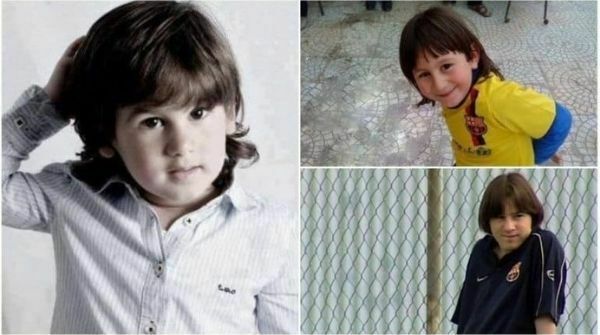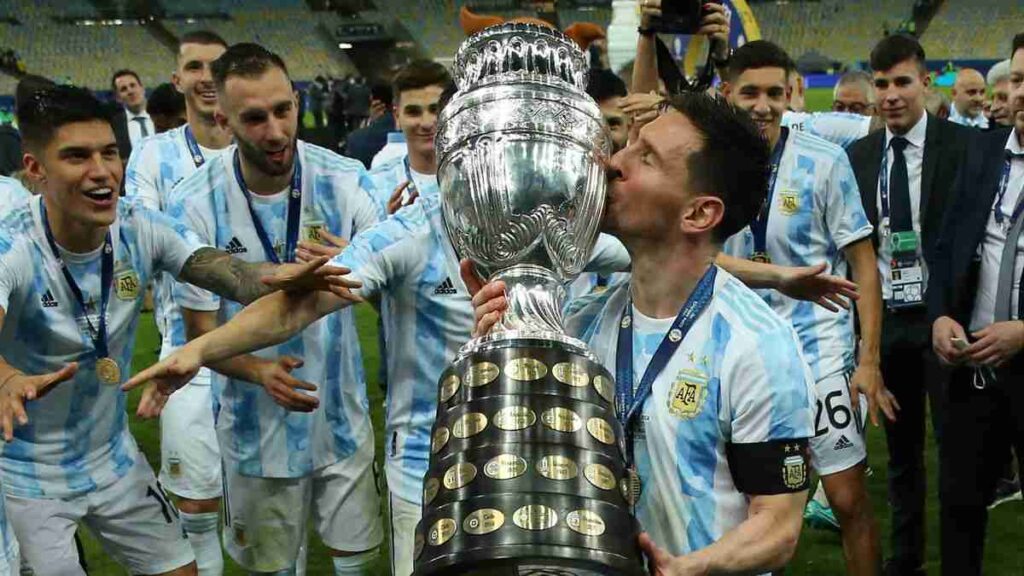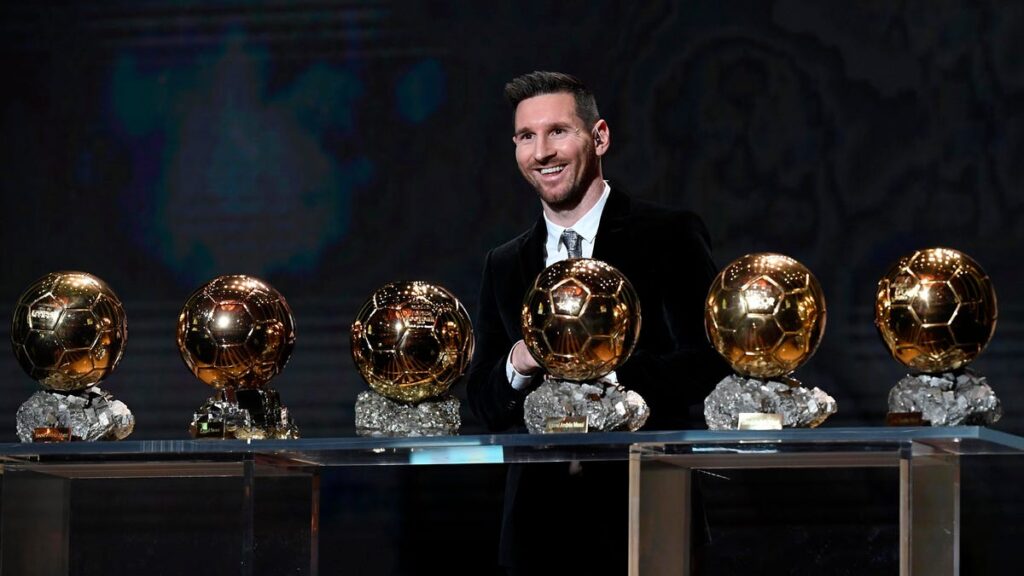Table of Contents
Introduction
Lionel Andres Messi whom the world knows as Lionel Messi is a professional football player who already played as a forward for the Argentina national team and Spanish club FC Barcelona and will now bring laurels for Paris Saint-Germain.

- Full Name: Lionel Andrés Messi
- Birth Date: June 24, 1987
- Birth Place: Rosario, Argentina
- Nationality: Argentina
- Height: 1.70 m (5 ft 7 in)
- Position: Winger, Attacking midfielder
- Number: #10, #30
The legend was born on 24 June 1987 in Rosario, Argentina. Messi’s father, Jorge, was a steelworker and coach of the local youth football team, that could be one of the reason for his exceptional talent.
Lionel Messi’s Family
- Parents: Jorge Messi (father) and Celia María Cuccittini
- Siblings: Rodrigo (elder brother), Matías (elder brother), and María Sol (younger sister).
- Wife: Antonella Roccuzzo
- Children: Thiago, Mateo, Ciro
Messi’s father, Jorge, was a steelworker and coach of the local youth football team, that could be one of the reason for his exceptional talent. Messi got into relationship in 2008 with Antonella Roccuzzo, he was 20 years old at that time. Roccuzzo is the cousin of Messi’s childhood friend, and they’ve known each other since age 5. Messi and Roccuzzo have three sons together.
Growth Hormone Deficiency and Entry in Football
In his childhood Messi had growth hormone deficiency, which was stopping his normal growth rate at a tender age of 11. Most importantly, his parents couldn’t afford his treatment which costed $900 per month at that time.
Though, his father’s medical insurance was there but it could only provide treatment for 2 years. So, his father took steps to find an alternative. They arranged his trials as his father was aware of his talent, Messi impressed many people with his unique playing style. In addition, Buenos Aires club scouted Lionel Messi, but they couldn’t afford his treatment. He left Rosario-based Newell’s Old Boys’s youth team in 2000 and moved with his family to Europe, as Barcelona offered treatment for his growth hormone deficiency.
| Just For You – |
| New Controversy in FIFA World Cup 2022 by Former FIFA President’s Statement |
| FIFA World Cup 2022 | Latest Information of FIFA World Cup |
Messi’s Career
Messi’s Journey
As he came from Argentina and considered as a foreigner, Messi couldn’t participate in the official youth team matches in his first year. Messi was part of the “Baby Dream Team,” which was Barcelona’s biggest ever youth side.During his full season in 2002, Messi was the top scorer with 36 goals in 30 games.
Messi played his first match against RCD Espanyol as 17 year old young player. Moreover, he became the third-youngest player to start for Barcelona and the youngest ever to score for the club.
Ronaldinho assisted Messi’s first senior goal. On his 18th birthday, Messi signed his first contract as a senior team player. He had a buy-out clause of €150 million and the contract extended until 2010. In the 2006 FIFA World Cup in Germany, Messi became the youngest player to represent Argentina in this competition.
His exceptional performances got him a nickname ‘Messiah’ which was given by Spanish media.Upon Ronaldinho’s departure in 2008, Messi took the iconic number 10 shirt.
Barcelona completed their Quadruple after winning the Supercopa de Espana, UEFA Super Cup, and FIFA Club World Cup. His incredible performances and ton of achievements fetched him his first Ballon d’Or and the FIFA World Player of the Year award that too at just 22 year of age.
Messi wore Argentina’s captain arm-band for the first time against Greece in the 2010 FIFA World Cup. However, Argentina failed to impress people with their performance and Messi went through a lot of backlash for not delivering his best for his own nation and playing ell for Barcelona. Despite of all this he won the inaugural FIFA Ballon d’Or (FIFA World Player of the Year) in 2010.
August 2011 was the time when Messi got captaincy of Argentina’s National team. Messi won his third FIFA Ballon d’Or in 2011, becoming only the fourth player in history to win the Ballon d’Or three times.
2012 was packed with appreciations and achievements for Messi. After becoming the first player to score five goals in a single Champions League game, Messi surpassed Cesar Rodriguez (232 goals) as Barcelona’s all-time leading scorer scoring a hat trick against Granada. Needless to say, that wonderful year earned Messi his fourth consecutive Ballon d’Or award, becoming the first player in history to win the prize on four occasions.
While Messi enjoyed worldwide recognition for his fantastic performances at FC Barcelona, he didn’t get the same kind of love in his home country. Though many Argentine fans admired Leo, his lack of success with the national team while he thrived in Spain made him a subject of criticism by the local media. In addition, he was also constantly compared with Diego Maradona.
Messi signed a new contract on May 19, 2014, which increased his salary to €360 million before taxes, the highest wage ever in the sport.
In 2014 World Cup his image started to improve, as he was scoring and leading his team towards final but unfortunately Argentina lost to Germany and Messi again missed from getting a Big Title of his nation, even though he won the Golden Ball award.

The trio of Messi, Suarez, and Neymar scored a total of 122 goals in all competitions, including 58 goals from Messi, in the 2014-15 season which is a record in Spanish football.
On September 16, 2015, Messi became the youngest player to make 100 appearances in the UEFA Champions League. On January 11, 2016, Messi won the FIFA Ballon d’Or for a record fifth time.
Retirement
In the Copa America final against Chile, Messi missed his penalty in the shootout after which Chile won the final. Messi announced retirement from the National team after the final. A few days after his retirement, Messi reversed his decision after a huge campaign from the Argentina supporters for him to return to the National Team.
FIFA World Cup 2018
Argentina went through a lot of struggle to get qualified for 2010 Fifa World Cup. The soccer federation went through significant changes in its hierarchy, while the team had three different coaches throughout the qualifiers. However, with Messi;s hat trick Argentina managed to get a spot in Russia.
Tournament started but Argentina was lacking high spirit and plan which proved right later. Messi missed a penalty in a 1-1 draw against Iceland, which was followed by an ugly loss to Croatia. The Barcelona star helped his side beat Nigeria to avoid a group stage exit, but Argentina then lost to France (World Cup 2018 Champions)
Leaving Barcelona
Differences between Messi and his club started rising due t several circumstances one of them was financial issues in the club. The Argentine footballer looked ready to leave in 2020 as a free agent, but it turned out that his contract didn’t allow it.
So, he stayed for the 2020-21 season, his toughest year at the club. Messi had entered the final year of his contract, but his mood had changed, though Messi became a free agent at the end of the season, he looked ready to re-sign.However, in a shocking turn of events, the club told Messi he couldn’t be registered in LaLiga due to salary cap rules. Thus, Messi left.
Back to Argentina (2019-2021)
Argentina’s coach changed and conditions were different now, this aided Messi to change his narrative and get himself involved in new team. Lionel Scaloni became coach of national team after 2018 World Cup and they together reconstructed the team. The team finished third in the 2019 Copa America, and from then on, there was no turning back. Argentina strengthened itself in South America, getting off to a positive start to the Qualifiers. A new generation of players had come and Messi started to feel more comfortable with them. Eventually, Argentina started to string good results together and it proved a point in the 2021 Copa America.
2021 Copa America Triumph
Messi achieved his first major success as they won 2021 Copa America Trumph by defeating the host country Brazil in final at the Maracana.Since then, Messi has received nothing but love from the Argentine community. Besides, he will now lead team in FIFA World Cup 2022, Qatar.

List of Messi’s Awards
Club Titles
FC Barcelona
- Champions League: 4 (2005-06, 2008-09, 2010-11, 2014-15)
- LaLiga: 10 (2004-05, 2005-06, 2008-09, 2009-10, 2010-11, 2012-13, 2014-15, 2015-16, 2017-18, 2018-19)
- Copa del Rey: 7 (2009, 2012, 2015, 2016, 2017, 2018, 2021)
- Club World Cup: 3 (2009, 2011, 2015)
- UEFA Super Cup: 3 (2010, 2012, 2016)
- Supercopa de España: 8 (2006, 2007, 2010, 2011, 2012, 2014, 2017, 2019)
PSG
- Ligue 1: 1 (2021-22)
- Trophée des Champions: 1 (2022)
International Titles
- Copa America: 1 (2021)
- Finalissima: 1 (2022)
- Olympic Gold Medal: 1 (2008)
- U-20 World Cup: 1 (2005)
Individual Honors
- Ballon d’Or: 7 (2009, 2010, 2011, 2012, 2015, 2019, 2021)
- FIFA World Player of the Year: 1 (2009)
- The Best Award: 1 (2019)
- European Golden Shoe: 6 (2009-10, 2011-12, 2012-13, 2016-17, 2017-18, 2018-19)
- Pichichi LaLiga: 7 (2009-10, 2011-12, 2012-13, 2016-17, 2017-18, 2018-19, 2019-20, 2020-21)
- MVP LaLiga: 9 (2008-09, 2009-10, 2010-11, 2011-12, 2012-13, 2014-15, 2016-17, 2017-18, 2018-19)
- Champions League top scorer: 6 (2008-09, 2009-10, 2010-11, 2011-12, 2014-15, 2018-19)
- 2014 World Cup Golden Ball: 1 (2014)
- UEFA Men’s Player of the Year: 2 (2010-11, 2014-15)
- Golden Boy: 1 (2005)
- MVP Copa America: 1 (2021)
Records
- All-time top goalscorer at same club
- FC Barcelona all-time top scorer
- All-time leading goalscorer of Argentina
- All-time top scorer in LaLiga
- Top scorer in the 21st century
- Top scorer in El Clasico
- All time international top scorer in South America
- Most games played for FC Barcelona
- Most games played with Argentina
- Most trophies won at FC Barcelona
- Most goals in a LaLiga season (50)
- Most decorated Argentine player

Overall stats
- Games: 988
- Goals: 780
- Assists: 339
- Cards: 94 (3 red cards)
- Opponents: 161
Goals
- Games: 507
- Goals: 780
- Coefficient: 1.538
- Penalties: 104
- Free Kicks: 60
Assists
- Games: 273
- Assists: 339
- Opponents: 98
- Players: 77
- Competitions: 11
Source for all stats: MessiStats
